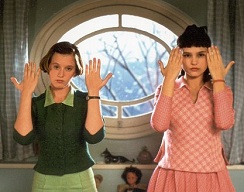 Ludivine Sagnier stars in Swimming Pool. |
Profile and Interview:
Ludivine Sagnier
by Carlo Cavagna
|
by Carlo Cavagna
|
||
![]() udivine
Sagnier does not owe her acting career to François Ozon. She has, after all,
been acting since she was a child. Ozon did not endow her with natural talent.
Nor is he responsible for her radiant good looks . Twenty-three year old Sagnier
was always going to act. She studied acting as a youngster at Y.D. Hieronimus
Drama School, and then at the Conservatory of Dramatic Art in France as a teen.
She made her feature film debut back in 1989 in Pascal Thomas' Les Maris,
les Femmes, les Amants and appeared in Cyrano with Gérard Depardieu
the following year. Her subsequent film, television, and stage credits are numerous.
udivine
Sagnier does not owe her acting career to François Ozon. She has, after all,
been acting since she was a child. Ozon did not endow her with natural talent.
Nor is he responsible for her radiant good looks . Twenty-three year old Sagnier
was always going to act. She studied acting as a youngster at Y.D. Hieronimus
Drama School, and then at the Conservatory of Dramatic Art in France as a teen.
She made her feature film debut back in 1989 in Pascal Thomas' Les Maris,
les Femmes, les Amants and appeared in Cyrano with Gérard Depardieu
the following year. Her subsequent film, television, and stage credits are numerous.
What Ozon did do is take the still-unknown Sagnier's career to the next level. In 2000, he chose her to star as a corner of a bizarre bisexual love quadrangle in Water Drops on Burning Rocks (based on the Fassbinder play), where she portrays a young woman whose fiancé drops her for an older man. Next, Ozon cast her as the youngest of 8 Women, released to critical acclaim in the United States in 2002. With the rest of the film's high powered cast (Catherine Deneuve, Isabelle Huppert, and others), Sagnier shared the European Film Academy Award for Best Actress and the Silver Bear Award at the 2002 Berlin International Film Festival. On her own, she also won the Romy Schneider Award (awarded annually to a promising French actress) and received a César nomination.
 Sagnier doing her number in 8 Women with Virginie Ledoyen. |
So, when Ozon re-teamed with Charlotte Rampling (with whom he made Under the Sand) for Swimming Pool, he knew he wanted Sagnier to play brazen Julie, who serves as both foil and muse to Rampling's uptight English mystery novelist, Sarah Morton. Even though Julie is quite a contrast to Sagnier's teenaged tomboy in 8 Women, Ozon knew she could do it. He held no auditions.
Like Under the Sand, Swimming Pool is a stark and psychological film, but it offers more color, conflict, and complexity. In it, Sarah goes to stay at her publisher's villa in the south of France to recharge, but Julie, the publisher's daughter, arrives to disturb her quiet. They immediately butt heads, yet in an odd turn of events, Julie becomes Sarah's inspiration as reality and Sarah's creative process converge, causing Sarah to gradually open up and experience the world instead of just writing about it. Meanwhile, Sarah's influence brings out the fragility underneath Julie's brash exterior.
In Los Angeles, prior to the film's U.S. release, Sagnier takes time to speak to reporters about Swimming Pool, François Ozon, and her next endeavor—playing a mute Tinker Bell in the big Christmas 2003 release Peter Pan. The Sagnier who walks into the room is closer to Tinker Bell than Julie—pretty rather than boldly beautiful; a bit timid rather than aggressive. Obviously, her acting involved more than creating believable emotions and natural speech. She had to embody a radically different person. Actors do so with the help of props and clothes, but in Swimming Pool Sagnier was denied these implements. Julie is frequently naked or nearly so. Sagnier's body was often her only prop, and she worked hard to shape it for the role. The dainty young woman now claims to have gained weight since completing Swimming Pool. (If so, she must have left it back in her hotel room; the weight is nowhere in evidence.) Her French accent is strong and she struggles somewhat to express complicated ideas, but she doesn't let these obstacles deter her from answering all questions fully and graciously.
[Read the AboutFilm review of Swimming Pool]
WARNING: For readers who have not yet seen Swimming Pool, the first two questions and answers contain a great deal of information regarding the resolution of the film that may spoil its enjoyment.
AboutFilm Question: Who is Julie?
Sagnier: She's a young French girl, kind of a stereotype from the south of France. She is very aggressive. She is kind of pretty, kind of sexy, and kind of pathetic. That's what we think about her at first sight. But, as the movie goes, she becomes more and more the target of Sarah's imagination, and she becomes the source of her inspiration. And then…do you want me to go on?
AboutFilm Question: My question was in view of the ending. Because I think there's a number of possibilities—she's a fictional person from the very beginning, based on the publisher's actual daughter, or she's a real person who evolves into someone partly fictional.
Sagnier: I would say, it's up to you. What I like about this movie is that you may think that she's only a reflection of the fantasy of Sarah, or you may think that she's the editor's daughter, and that she's been really disordered, or you may think that everything is in Sarah's mind. And, whatever you may think, you've got the truth.
Question: It's your third movie with François Ozon. Is it easier to work with someone you've already worked with? Does it make your work easier?
Sagnier: Well, it's easier in a way that you know you're working hard on something with somebody who trusts you and who believes in what you're doing. It's also easier because François Ozon always uses the same crew, so I'm not only working with him again, but a whole bunch of people. But, it's harder in the way that he's more and more demanding toward me. Every time it's a new and harder challenge.
Question: Does the creative process ever blend into your life, too? How do you keep the two separate?
Sagnier: Well, it's really hard to keep them separate, actually. That's why I felt so close to Julie. Because I wasn't supposed to be that close to a little slut coming from [unintelligible]. [laughs]
Question: [joking] But you turned into one?
Sagnier: No, I didn't get that chance, because I put on weight since. But no, this idée of hovering between fiction and reality all the time, and being lost in this idea— As an actress, I'm supposed to create something from head to toes, with clues, with lines, with shapes, and even with that power, I felt lost and not in control. I didn't know what was happening to me, because François is a very good director, and he directed me in a way that I couldn't realize what was happening to me, so I felt like— It doesn't make sense.
Question: Keep going.
Sagnier: Okay. [laughs] I had a lot of questions about this character. So I asked François to give me some clues. And he never gave me any answer. I didn't understand why at the beginning. I thought he was very selfish, and that he didn't direct his actresses, and he was a bad director. I was angry at him. But, I realized that as he wasn't giving me any answers, he was leaving me in a complete blur. I didn't know what to think about psychological background, and how she could handle the situation with Sarah. So I was lost. I didn't know how to express it. I was like [mimics hyperventilating], "What's going on?" I was very feverish and disturbed. And [then] I realized that if I was like this, it was because François fed this insecurity, pretending he wasn't directing me. I was exactly in the same state that Julie was toward Sarah. As an actress, I think I really understand that stage where you think you are picking reality in order to feed the fiction, but it happens to be the contrary. It's the fiction that suddenly feeds your reality. And you don't know how it has been done. That's the kind of magical transposition that is art.
Question: Aside from the brief dance to "Let's Do It," did you miss not having a dance number like in Water Drops on Burning Rocks and 8 Women?
Sagnier: Yeah, I miss the choreography. But, it was funny, because in this one I had to be very pathetic, you know. [Julie is] a poor girl in this scene. She's trying to do everything she can, but she's a bit lost.
 Ludivine Sagnier in Swimming Pool. |
Question: What about the nudity? You seemed very comfortable with it.
Sagnier: Well, I wasn't.
Question: You weren't? But you did it anyway.
Sagnier: Yeah, because I was paid for it. [laughter]
Question: What about your character? Do you think she thought she was being shocking, or do you think she felt that the nudity was perfectly normal?
Sagnier: She doesn't care about nudity, and that's why I could cope with it. It's because once I had embraced the character, I didn't think about my own inhibitions. Once I looked in the mirror [and saw this girl] with all this tan, these clothes, this makeup, all these artifices, I couldn't recognize myself. I didn't have anything to with Ludivine, who is self-conscious in front of the camera. It was Julie, who is a bitch, who doesn't care, who is suffering, who needs attention, who needs tenderness, who's trying to fill a lack of tenderness with bringing a different man home every night. I don't know, there's a kind of chemical spark that comes sometimes with the character, that you don't even have to think about how she is reacting, you just let yourself go. You just let the character take you, instead of taking the character. And that's what the movie is about.
Question: In the original script, the Julie character was a man.
|
More from Ludivine Sagnier Question: How would you define Julie's relationship with Sarah? Sagnier: When Julie enters the film, her arrival lets you think that she and Sarah are going to stay at odds, against the backdrop of this swimming pool. Then, little by little, Sarah's personal attraction to Julie cues an evolution of their relationship. By pairing me with Charlotte in this movie, François merges two currents of his cinema. I come from his more stylized current, the conceptual and theatrical one represented by Water Drops on Burning Rocks and 8 Women. Charlotte comes from Under the Sand, a much more intimate film. In Swimming Pool, these two currents clash and electrify each other and the interplay between Julie and Sarah. Julie is very artificial, verging on vulgar. Sarah is more intellectual and interior. Over the course of the film, we see the two characters confront each other and develop differently: Julie grows introspective while Sarah blossoms physically. I believe that, with Swimming Pool, François wanted to tell a very personal story. About how the boundary between fiction and reality can sometimes be very slight and unsteady. And about creator and muse: how a creator can be overwhelmed by his or her muse and how, conversely, the muse can be completely bled dry by the creator. |
Sagnier: Yeah, it was for a boy. When François is asked this question, he answers that it became too obvious that there was going to be an ambiguity between them. As he wanted to surprise the audience, he didn't want the audience to think that there was going to be a sexual ambiguity, because it's not about sexual ambiguity between the two characters. As he didn't want to set the encounter around this idea, he thought it would be much easier to use a girl.
Question: But there's a sexual conflict anyway between those two characters.
Sagnier: Yes. But there's not a sexual attraction. Well—sometimes it could be, but it doesn't take the track, because he was naughty enough in 8 Women.
Question: Do you have any, like Julie and Sarah, older age friend or mentor in your life?
Sagnier: Yes, I got a friend who is called Charlotte Rampling, who is fifty-something— [laughter] Yeah, of course I have friends this age.
Question: Now with Peter Pan you've broken into American movies and Hollywood cinema.
Sagnier: Well, I've done one. It was a wonderful adventure. I would even say it was an awfully big adventure.
Question: It's a big movie in terms of money, probably the biggest one you've ever been in.
Sagnier: Yeah, it's a big movie. I think the whole budget of the movie is the [total] amount of all the low budget movies I've done. I think it would be more, maybe.
Question: Is this something you would want to do regularly, or would you stay in France?
Sagnier: I don't know. I'll just catch the opportunities that come to me. Peter Pan was a great opportunity, but not for entering the American industry. I had been offered other things before, and I didn't take them because I wasn't interested in the part. I'm not interested in—it may sound [like I think I'm] special—I'm not interested in making money, or being wealthy enough to have a villa in Beverly Hills, because in Paris I don't need that much money. So, to catch the part of Tinker Bell in Peter Pan, it was more because of the adventure of being a fairy, being magical, flying, being on the wires, and miming, because the part is mute. It was more because of the challenge than a real interest for starting to build up an American career. I'm French, and I have problems with my English, as you can hear. And so maybe I'm not ready enough. I don't know. I would love to meet some directors, and why not do some other movies in America? But, I'm not obsessed with this idea. I'm feeling very free in Europe.
Question: Was an advantage or disadvantage to be mute as Tinker Bell?
Sagnier: I don't know. It was a pleasure, because it was very different from what I had done before. It was more miming than proper acting, and it was very clownish. It was a kind of work that I hadn't been proposed before. The references were more like cartoons and silent movies, and comics, too. It was a thrilling opportunity to get into that kind of cinema, and also to have the occasion of working with special effects, to have a view of how they make such movies, so big and all that. It was good. What was hard about this character was that I was on a blue screen all the time. I didn't have any partner. The only partners I had were gaffer tapes. I felt very lonely sometimes. I hate to recreate the whole world into my imagination. That was the work, focusing and imagining all this, so it was very draining. Plus, the wires. Plus sometimes I had to act. [laughs]
Question: So Charlotte Rampling is better than gaffer tape?
Sagnier: Oh yes. She's a much more living person. [laughs]
Question: With Swimming Pool and Peter Pan, does that mark an interest like Charlotte Rampling in alternating between French and English language roles?
Sagnier: Yes, I think so. Well, I didn't compare really to Charlotte. I like to bounce in a different universe. So, in a way, yes, I like to do the [smaller] budget in France, and [then] to have the opportunity to know what is bigger. I want to go back and do some small theater in Paris, maybe. You know, changing environments, definitely. And Charlotte, I think, yeah, she's been taking a lot of risks throughout her career, and she's now fifty-something, and she's still as daring as she was, and she got wiser. She stayed beautiful, and calm, and graceful, and clever. So of course I would take a big example from her.
Feature and Interview ©
July 2003 by AboutFilm.Com and the author.
Images © 2002 and 2003 by Focus Features. All Rights Reserved.
| Related Materials: | ||
| |
||
| |
||
| |
||
| |